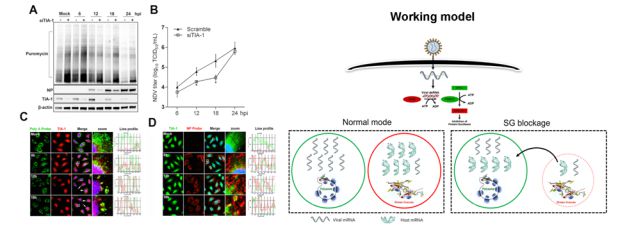分享到
A Novel Mechanism on Newcastle Disease Virus Inducing Stable Formation of Bona Fide Stress Granules to Facilitate Viral Replication Found by SHVRI
Recently, the Waterfowl Virus Innovation Team from Shanghai Veterinary Research institute ( SHVRI )found that Newcastle disease virus (NDV) induces stable formation of bona fide stress granules (SG) to facilitate viral replication through manipulating host protein translation. The results were published online in FASEB Journal (Impact factor: 5.299).


NDV was considered as the important avian virus causing great damage in poultry industry. NDV selectively replicates in chicken and tumor cells, but not in normal cells. The study of NDV replication mechanism is of great significance to anti-NDV and anti-tumor therapy. Mammalian cells enter a relatively stable state by temporarily inhibiting cellular protein translation when exposed to various environmental stressors. In this case, SG is induced to arrest cytoplasmic mRNA, protein translation factors, and RNA binding proteins. In our current study, NDV triggered stable formation of bona fide SG through PKR/eIF2a pathway. NDV infection results in the inhibition of total host protein translation but not viral protein translation. SG blockage significantly inhibits virus replication. Mechanistically, SG specifically recruits host mRNA, whereas virus mRNA employs some unknown mechanism to escape from SG package. Blockage of SG results in the release of host mRNA into polysomes to competitively binds to translation factors, which lead to the decrease of viral mRNA translation level. This results give an explanation how virus utilize SG to promote its own replication.
Most of the previous reports identified SG as a host defense mechanism. Few of reports showed the pro-viral role of SG. However, the concrete mechanism has not been elucidated. Our study first give the explanation of how SG promotes virus infection, which is of great theoretical value and practical significance.
The first author of the study is Dr. Yingjie Sun from Shanghai Veterinary Research Institute. The corresponding author is Prof. Chan Ding, the chief expert of Waterfowl Virus Innovation Team. The study was supported by the National Natural Science Foundation and The Innovation Project Funding of Chinese Academy of Agricultural Science.
Paper link:http://www.fasebj.org/content/early/2016/12/23/fj.201600980R.abstract
Most of the previous reports identified SG as a host defense mechanism. Few of reports showed the pro-viral role of SG. However, the concrete mechanism has not been elucidated. Our study first give the explanation of how SG promotes virus infection, which is of great theoretical value and practical significance.
The first author of the study is Dr. Yingjie Sun from Shanghai Veterinary Research Institute. The corresponding author is Prof. Chan Ding, the chief expert of Waterfowl Virus Innovation Team. The study was supported by the National Natural Science Foundation and The Innovation Project Funding of Chinese Academy of Agricultural Science.
Paper link:http://www.fasebj.org/content/early/2016/12/23/fj.201600980R.abstract
By Sun Yingjie
sunyingjie@shvri.ac.cn
sunyingjie@shvri.ac.cn
Latest News
-
 Apr 18, 2024Opening Ceremony of the Training Workshop on Wheat Head Scab Resistance Breeding and Pest Control in Africa Held in CAAS
Apr 18, 2024Opening Ceremony of the Training Workshop on Wheat Head Scab Resistance Breeding and Pest Control in Africa Held in CAAS -
 Apr 03, 2024IPPCAAS Co-organized the Training Workshop on Management and Application of Biopesticides in Nepal
Apr 03, 2024IPPCAAS Co-organized the Training Workshop on Management and Application of Biopesticides in Nepal -
 Mar 28, 2024Delegation from the School of Agriculture and Food Science of University College Dublin, Ireland Visit to IAS, CAAS
Mar 28, 2024Delegation from the School of Agriculture and Food Science of University College Dublin, Ireland Visit to IAS, CAAS -
 Mar 25, 2024Director of World Food Prize Foundation visited GSCAAS
Mar 25, 2024Director of World Food Prize Foundation visited GSCAAS -
 Mar 20, 2024Institute of Crop Sciences (ICS) and Syngenta Group Global Seeds Advance Collaborative Research in the Seed Industry
Mar 20, 2024Institute of Crop Sciences (ICS) and Syngenta Group Global Seeds Advance Collaborative Research in the Seed Industry
